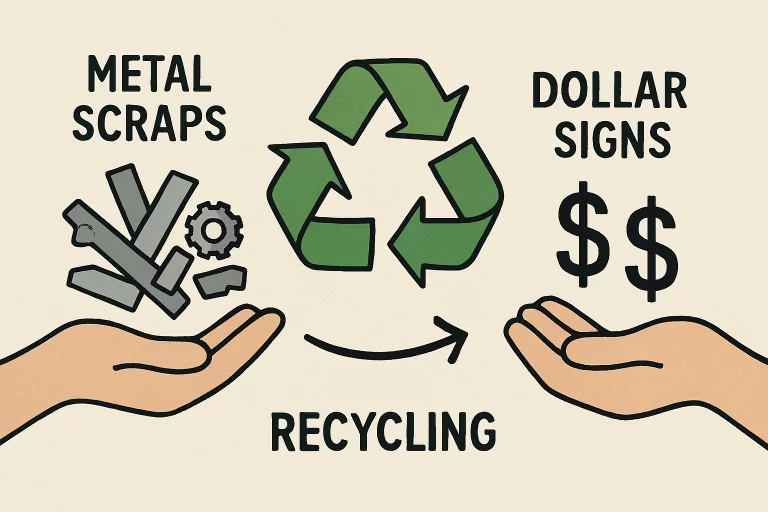How Metal Recycling Benefits the Environment and Your Wallet

Table of Contents
Conserving Natural Resources
Extracting primary metals such as aluminum, copper, and steel from the earth is a demanding and resource-intensive. Mining for these metals accelerates the depletion of finite natural resources and frequently disrupts local ecosystems through deforestation, soil erosion, and contamination of water sources. When you choose to recycle metals by bringing materials to a reputable metal scrap yard, you help conserve these precious materials for future use, reducing the need for further mining. Recycling aluminum saves nine tons of bauxite ore, which is crucial for future manufacturing. It conserves metals, reduces water usage, and supports healthier habitats. Community-level recycling efforts slow resource extraction, promote sustainable living, and reduce habitat destruction, pollution, and biodiversity.
Energy Savings and Emission Reductions
Recycling existing metals dramatically reduces the energy required to extract, refine, and manufacture new products from virgin ore. For example, recycling aluminum can save up to 95% of the energy needed compared to producing it from raw bauxite, while recycling steel saves around 60%. These substantial energy savings help decrease fossil fuel consumption and lower the emission of harmful pollutants into the atmosphere. As a result, metal recycling plays a critical role in mitigating climate change and improving air quality. The energy saved by recycling steel yearly is enough to power approximately 18 million American households. Both individuals and businesses contribute meaningfully to environmental health and the overall well-being of communities by choosing to recycle.

Reducing Landfill Waste
Metal waste, including food cans, appliances, and electronic devices, is a significant environmental issue. Millions of tons of waste are deposited in landfills each year, posing long-term environmental risks. Recycling metal products diverts these materials from landfills, conserves space, and extends the life of waste facilities. It also prevents hazardous materials from entering the environment, protecting public health and wildlife. Community initiatives to recycle metals can significantly decrease waste production and promote sustainable city planning.
Economic Benefits of Metal Recycling
Metal recycling is a vital industry that supports economic growth and generates billions of dollars in economic activity. It involves hundreds of thousands of jobs in the US, from metal collection to transportation and new product manufacturing. It also provides an accessible way for individuals and small businesses to generate extra income by trading in items like aluminum cans, copper wiring, steel appliances, and brass plumbing fixtures. Recycling turns potential waste into valuable assets, transforming environmental stewardship into a practical income source and supporting local recycling businesses.
How to Get Started with Metal Recycling
To recycle effectively, identify recyclable metals in your home and workplace—common examples include aluminum, copper, steel, and brass. Use a magnet to distinguish between ferrous and non-ferrous metals. Next, separate and clean your scrap by removing non-metal components and scrubbing away any oil, grease, or dirt. Then, locate a nearby recycling center that accepts the types of metals you’ve collected. It’s also essential to stay informed—keeping up with local recycling guidelines and fluctuating metal prices can help you maximize returns. Online tools offer real-time updates to help you time your recycling for the best payout. By following these practices, you support environmental sustainability and enjoy financial benefits. Metal recycling is a straightforward yet impactful way to contribute to your community and the planet.






